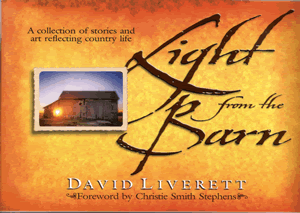Wisdom in a Round Barn
 David Liverett has just published a wonderful new book, Light from the Barn: A collection of stories and art reflecting country life. Barry L. Callen, editor of Anderson University Press, wrote the following essay to reflect on Liverett's ink drawing of The Round Barn Theatre at Amish Acres. He captures the essence of forty years of preserving and restoring Amish Acres and the mission that has guided its creation better than I have ever written.
David Liverett has just published a wonderful new book, Light from the Barn: A collection of stories and art reflecting country life. Barry L. Callen, editor of Anderson University Press, wrote the following essay to reflect on Liverett's ink drawing of The Round Barn Theatre at Amish Acres. He captures the essence of forty years of preserving and restoring Amish Acres and the mission that has guided its creation better than I have ever written."Many barns today are little more than architectural antiques sitting here and there on the back roads of the American landscape. Housing developments and superhighways sprawl over former farmland, showing little respect for the agricultural life so common in the recent past. Barns do survive, of course, but too often they are pathetic looking, aged strugglers with neglect, animals long gone, paint peeling, the roof ready to collapse. They are pictures of pain. How good it is to find a rare link with the past that retains its pride and speaks gently and helpfully of a time largely gone, a time that can be of meaning to the time now here.
One such link with American history sits on a farm in Northern Indiana that is on the National Register of Historic Places and draws thousands of tourists each year. The people who come to this rural retreat usually are intent on touching remnants of a simpler way of life that is now mostly absent from their experiences. Visits to Amish Acres typically involve entry into a round barn dating to 1911 and now dismantled, reconstructed, and converted into a state-of-the-art regional theatre that seats four hundred people at a time. Featured for the last two decades on the well-equipped stage in the barn is the production titled Plain and Fancy. A modern couple from the big city get stranded among the Amish. The clash of cultures is both entertaining and moving, a delightful experience that is also a pointed critique of the frantic pace and shoddy values of today’s urban existence.
Twice I have sat through this production in the barn, hoping both times that the best of the past will be allowed to bring wisdom to the dilemmas of the present. Yesterday is gone and we should not be trapped in mere nostalgia. Even so, the newest is not necessarily the best. This one barn tries to be a living link, a cultural mixing place, a stage for the drama of passing time, a symbol of yesterday seeking to address tomorrow. Its prophetic plain words, however, will remain silent to fancy ears unless there is a will to hear and learn. Why not take a trip to the barn? Don’t look back as a way of running from the present. Look back for a while in order to be better prepared to look ahead with fresh inspiration and greater resolve to make a difference in your own time."
Chinaberry House Publishing

0 Comments:
Post a Comment
<< Home